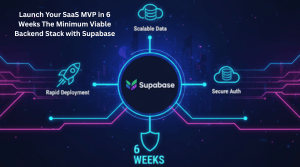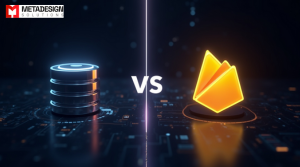You’ve spent countless hours following tutorials, building your Supabase-powered MVP, and celebrating the fact that you got your project off the ground. Your app is live, your database is up, and everything’s looking good — until real traffic and real users start hitting your platform. That’s when things start to get tricky.
We’ve all been there. Tutorials and online guides can get you pretty far — but as your app grows, you inevitably run into challenges that a basic understanding of Supabase just can’t solve. This is the moment when your Supabase project needs a senior-level consultant.
In this post, we’ll explore when your Supabase project needs expert consulting, why it’s crucial, and how to find the right consulting help to make sure your app scales smoothly and performs well under pressure.
Why Supabase Is Easy to Start — But Hard to Scale
Supabase is a fantastic tool for building modern apps quickly. It offers a complete backend-as-a-service (BaaS) with PostgreSQL, authentication, real-time subscriptions, file storage, and serverless functions — all in one platform. You can set up your database, API, and authentication in no time. Many developers use tutorials and Supabase’s autogenerated APIs to build MVPs quickly, which is great for the early stages of development.
However, there’s a catch. What works beautifully for an MVP — an app with limited users and basic functionality — often starts to break down when your user base grows, or when your app needs to handle complex data and more sophisticated business logic.
As you move beyond the tutorial stage, you’ll start encountering issues that demand a deeper understanding of Supabase development services and its underlying technologies (PostgreSQL, real-time performance, complex security). And this is where senior-level consulting becomes invaluable.
5 Signs Your Supabase Project Needs Senior-Level Consulting
You’ve built your Supabase app, followed tutorials, and deployed it to production. But now that it’s in the wild, you’re noticing issues. Maybe your app is starting to feel sluggish, or your database queries are taking longer than they should. Perhaps you’ve started adding more complex features and realized that Supabase can do a lot, but you’re unsure how to best structure everything to handle the load.
Here are five clear signs that you need to bring in a Supabase expert to ensure your project can scale and perform optimally.
1. Database Performance Bottlenecks
One of the most common issues when working with Supabase (or any relational database) is slow queries and database timeouts. As your app grows and more users interact with your platform, you may notice that some database queries take longer than expected. Simple queries may become slow, especially when your data grows larger, and without proper indexes or schema optimization, these bottlenecks will only worsen.
What you need:
A senior consultant can optimize your queries, add the right indexes, and ensure your database is properly designed for the scale you’re aiming for. This might include redesigning your schema or improving your use of relational data to make queries more efficient.
2. Complex Auth & RLS Policies
Supabase’s Row-Level Security (RLS) is a powerful feature for multi-tenant SaaS applications. However, setting up RLS for complex roles, permissions, and multi-tenancy scenarios can be tricky. A consultant can help ensure that your RLS policies are correctly implemented and optimized, preventing security holes and performance issues.
What you need:
You need someone who understands not only how to set up RLS but also how to make it scalable and secure for real-world applications, especially when you have different user types, permissions, and organizations.
3. Integrating Third-Party APIs or Payments
When you start integrating third-party services like Stripe, SendGrid, or other APIs, things can quickly get complicated. Handling webhooks, ensuring data integrity, and scaling these services to handle a large number of requests can become a headache. You’ll need a senior consultant to ensure that these integrations are seamless, efficient, and robust enough to handle heavy traffic.
What you need:
Senior-level help to handle complex API integrations, including webhook management, transactional safety, and ensuring data flows securely between services.
4. Scaling Beyond Free Tier or Self-Host Setup
Many developers start with Supabase’s free tier or opt to self-host it for cost reasons. However, once your app hits higher traffic levels or requires production-grade infrastructure, you’ll need to scale beyond the free tier. This might involve setting up multiple instances, backups, data replication, and monitoring to ensure your app remains performant and reliable.
What you need:
A consultant can guide you through migrating your Supabase instance to a production-grade setup, whether that’s scaling vertically or moving to a managed Supabase environment, and they’ll help with proper configuration and backups.
5. Lack of Observability or Cost Control
One common pitfall in early-stage projects is not having the right monitoring tools or visibility into how the backend is performing. This lack of observability can lead to performance degradation or hidden costs as your app scales. Without tracking query performance, API latency, or database storage usage, you can easily miss areas where optimization is needed.
What you need:
A consultant will implement logging, monitoring, and cost control measures to give you insights into your system’s performance. This will allow you to keep an eye on performance bottlenecks and avoid sudden spikes in cost, especially if you’re using Supabase’s hosted services.
Supabase Meets The JVM Powerhouse
Is your project hitting its limit due to integration complexities? We specialize in securely integrating Supabase with high-performance Groovy and Grails backends. Let’s architect your hybrid solution.
What a Supabase Consultant Actually Does (and Why It’s Worth It)
When you hire a Supabase consultant, you’re getting more than just someone who can follow along with tutorials. Here’s a breakdown of what a senior-level consultant will do for your project:
1. Architecture Auditing
Your consultant will review your app’s architecture and identify areas where it can be optimized for scalability, reliability, and performance. This includes reviewing your database schema, data relationships, and ensuring that your Supabase instance is configured for the long term.
2. Performance Optimization
Performance is key when scaling. A consultant will dive deep into your queries, indexes, and Postgres configuration to ensure your app performs optimally under load. They’ll also optimize real-time subscriptions, caching strategies, and more.
3. Migration Planning
When you’re ready to move from MVP to production, or if you’re considering migrating from Firebase or another platform to Supabase, a consultant will help plan and execute your migration to ensure it’s seamless and doesn’t cause downtime.
4. Security & Compliance
Supabase’s built-in security features, like RLS, help secure your data. But a senior consultant will ensure your app meets industry compliance (like GDPR) and can help with data encryption, secure storage, and other security protocols.
5. Long-Term Scalability
The goal is not just to get your app working today but to future-proof it. A senior consultant will create a plan that allows your app to scale easily as you grow, from handling thousands of users to eventually scaling to millions. This includes database partitioning, multi-region setups, and considering global data latency.
DIY vs. Senior Consulting: The ROI Mindset
The question arises: Why spend money on consulting when you can just continue building yourself? Here’s the breakdown:
Scenario | DIY / Tutorials | Senior Consulting |
Setup time | Quick, but risky | Strategic & scalable |
Cost upfront | Low (but often leads to rework) | Moderate (with clear deliverables) |
Cost long-term | High (due to fixes, performance issues) | Controlled and predictable |
Expertise level | Surface-level (lacking depth) | Deep Postgres & system design |
Best for | MVPs, prototypes | Production-ready apps |
As you can see, while DIY might get you started, consulting ensures that you don’t waste time or money fixing problems later on.
How to Find the Right Supabase Consultant (and What to Look For)
When searching for a Supabase consultant, here’s what you should look for:
1. Postgres Expertise
Since Supabase runs on PostgreSQL, you need someone who understands Postgres fundamentals, including indexing, query optimization, and connection pooling.
2. Real-World Experience
Look for consultants with real-world experience working on production-scale applications. They should have case studies or examples of Supabase projects they’ve helped scale.
3. Architecture Planning Skills
The best consultants are proactive — they’ll help design a scalable and secure architecture for your app, not just fix bugs.
4. Clear Communication
It’s important that your consultant doesn’t just work on your project, but also helps your team understand the why behind their decisions.
5. Transparent Pricing
Good consultants will be clear about their pricing model — whether that’s hourly rates, fixed projects, or milestones. Make sure you have a clear agreement on deliverables and timelines.
When to Bring Consulting In (Before It’s Too Late)
It’s always best to bring in experts before the problem escalates. Here’s when you should consider consulting:
- Before launching a high-traffic feature that could cause performance issues.
- Before migrating your app from MVP to production.
- When you see query latency or rising costs that need to be addressed.
- When you notice that RLS or multi-tenant logic is starting to break.
Case Example: From DIY to Production-Ready Supabase
A SaaS startup built their MVP using Supabase and launched with a small user base. However, when their user base hit 20,000, the app’s performance started to degrade. Queries were slow, and real-time subscriptions were breaking.
After bringing in a Supabase consultant for two weeks, they:
- Optimized their Postgres schema
- Added the correct indexes
- Improved caching and connection pooling
- Implemented better error logging and monitoring
Results:
- The app became 3x faster under load.
- Query response time decreased from 1.5 seconds to 0.5 seconds.
- Monthly server costs decreased by 30% with better resource management.
Conclusion: Move Beyond Tutorials — Build with Confidence
Supabase is a powerful tool that helps you launch quickly. But when you’re ready to move beyond the basics and ensure your app scales, it’s time to bring in senior-level consulting. A consultant will help you avoid costly mistakes, optimize your performance, and future-proof your architecture.
If your Supabase app has grown beyond the MVP stage, consulting is an investment that will save you time, money, and headaches in the long run.
“Don’t wait until your app starts breaking — move beyond tutorials and build with confidence by bringing in the experts.”
Ready to optimize your Supabase app for scale and performance? Talk to a Supabase consultant today and ensure your backend is set up for success.
Relevant Hashtags:
#GroovyProgramming #GrailsFramework #GroovyCode #SpringFramework #Ratpack #BuildAutomation #DeveloperProductivity #CodeOptimization #LessBoilerplate #DevLifeHacks #AgileCoding #GroovyConsulting #ITConsulting #ScaleUpTech #DedicatedDevelopers #TechRecruitment


